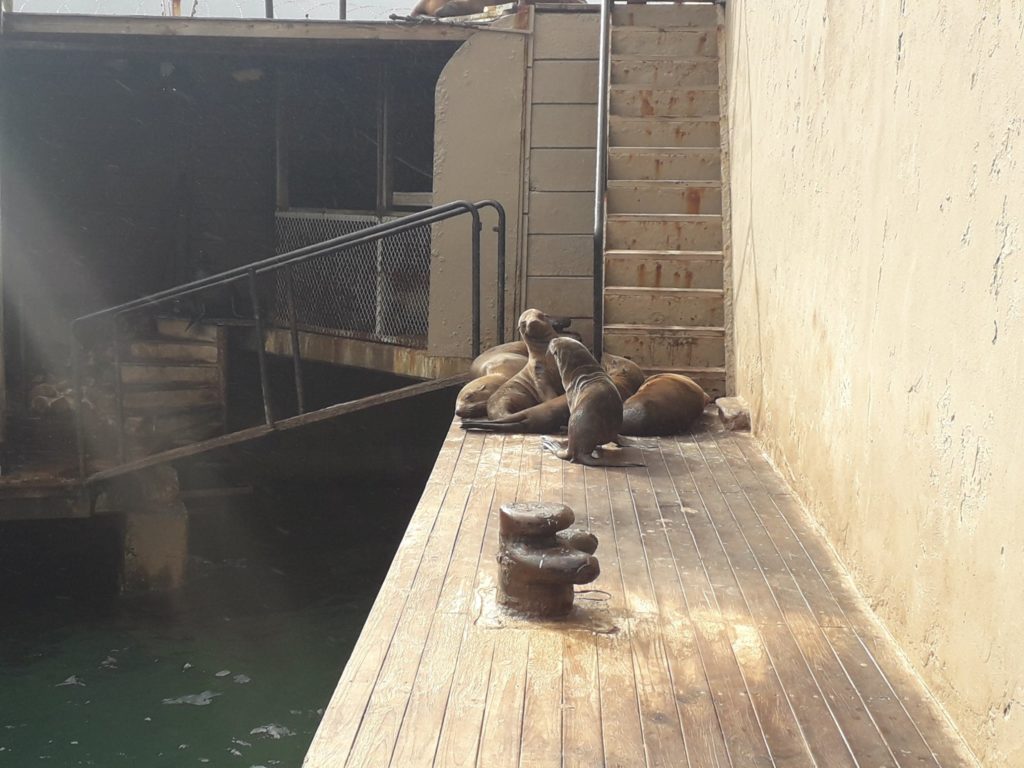A starving seal drew citywide attention on June 30 when he banged on the door of Pakalolo Restaurant in Table View to beg for food and water. Locals quickly sprung to action to keep him safe until a rescue team could arrive to help him.
The seal was rescued by the Hout Bay Seal Rescue Centre team, and was assisted by the SPCA Wildlife Unit and the fast-acting members of the public who cordoned off the roads to keep him safe until help arrived.
The seal is now safe at the Hout Bay Seal Rescue Centre. Kim, a representative from the NGO, tells Cape Town ETC that he has a serious injury on his nose that appears as if he had been cut by a knife. Upon arrival at the Centre, they administered him with antibiotics and cortizone to treat him. The seal joins many other large seals at the Centre, where they will continue to monitor him and rehabilitate him until he can be safely released.
Kim says that it is quite unusual for seals to beg for food in this manner, and they will generally only do this if they have been fed like this in the past.
“Seals only enter human spaces when people feed them. This is an ongoing problem in Hout Bay because the homeless people make money from this. They feed the seals and this attracts tourists who find this amusing. It is extremely dangerous as we are dealing with wild animals. This in turn is not good for the poor animal as they now start walking into restaurants.
“During lockdown, it was easy for animals to make their way into the road. He looked very comfortable in the road and around people. This tells us he is probably a seal that lives in the harbour, probably at the Waterfront.”
Unfortunately, not many seals have the same luck as this rescued one. Kim tells Cape Town ETC that they encounter many seals with serious injuries, which she says is often at the hands of fishermen.
“We experience a lot of open wounds like knife wounds, bullet holes, clubbing, etc. It is a horrific situation that needs to be addressed. We also experience seals being entangled in fishing gut, fishing nets, wire and we are often removing these items from these animals.”
Kim advises that anyone who comes into contact with a seal in a public space should stay clear from the animal and remain calm. She says you should not throw water on or at the seal or give it food. Instead, people must call the Hout Bay Seal Rescue Centre or the SPCA Wildlife Unit to come and assist.
The Hout Bay Seal Rescue Centre was founded in 1999, and their main focus is to rescue and rehabilitate Cape Fur Seal pups and yearlings, and to integrate them back into their natural seal colony’s in Hout Bay, which is on Duiker Island. They have a volunteer team that goes out to capture seals in need and bring them to the centre for care.
“Duiker Island, just off Hout Bay, has become one of the top attractions in the Western Cape. However, the boat-loads of tourists, who make the journey, are seldom aware of the plight of survival faced by the seal pups and yearlings, which is extremely challenging for them,” reads the Centre’s funding proposal.
“The primary breeding season for the Cape Fur Seal is in November and December. Some of the young seal pups that are born are often very thin and weak and they may be washed off the rocky islands and swept ashore by rough seas. These very young pups are often sick and injured, and require veterinary assistance and specialised feeding. ”
The seals are immediately treated for dehydration and are tube fed at regular intervals throughout the day and night to ensure sustenance is provided to the distressed seals. Where necessary, they request veterinary assistance. They have a large water enclosure in the centre, where the seal pups can safely enter and learn to swim until they are fully strong, healthy and able to fend for themselves in the large ocean. The length of assistance and recuperating time varies for each young pup, ranging from 6 months to a year.
The centre operates 24 hours a day, 7 days a week, 365 days of the year and has three full time Seal Carers who work on a shift rotation. The NGO is in need of donations, and every bit helps to continue the very important work they do and to support their dedicated staff. If you would like to financially support, donations can be made to:
Hout Bay Seal Rescue Centre
– First National Bank
– Account Number: 628 464 01579
– Branch Code: 255355
– SWIFT Code: FIRNZAJJ

To find out more about the Hout Bay Seal Rescue Centre, read their funding proposal: HBSRC Funding Proposal.
Picture: Facebook / Hout Bay Seal Rescue Centre

